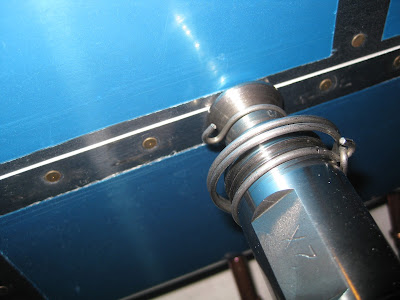Bottom skins are on the ailerons. Trailing edge wedges and lateral rib riveting remains. Below images have left on left and right on right.
I used AN426AD3-4 rivets on the lateral-most holes. This is where the nose skin, spar and main ribs' tabs mate. The AD3-3.5 called out in the plans are too short, as I determined when doing the analogous holes on the top skins. When using a AD3-3.5 on the bottom skins, you risk the rivet not catching the rib's tab, making life very difficult (this is because, in order to get your hand on the bucking bar resting on the spar, you need to pull the bottom skin out, which positions the tab off the rivet). I drilled out a rivet four times before I decided to up the length to an AD3-4. Below is the left aileron inboard side with the bottom on the bottom. The bottom inboard-most rivet is AD3-4 whilst the top inboard-most rivet is AD3-3.5.
For the inboard-most spar-nose skin rivet, I used the back rivet set to hit the manufactured head. This is because the overlapping bottom skin immediately adjacent creates a standoff that prevents you from getting the rivet flush if you use a mushroom set.
The plans warn against letting the bucking bar drive into the stiffeners of the bottom skin, so be mindful of your bucking bar size and test its fit before use. Mine just cleared the stiffeners, so I had no issues.
I calibrated my gun's air pressure so two half-second hits would completely set each rivet. When riveting, placing the mushroom set so it also just overlaps the joint between the skins helps smash the skins down and eliminates pillowing between rivets. I ended up with awesome, gap-free seams.
I used AN426AD3-4 rivets on the lateral-most holes. This is where the nose skin, spar and main ribs' tabs mate. The AD3-3.5 called out in the plans are too short, as I determined when doing the analogous holes on the top skins. When using a AD3-3.5 on the bottom skins, you risk the rivet not catching the rib's tab, making life very difficult (this is because, in order to get your hand on the bucking bar resting on the spar, you need to pull the bottom skin out, which positions the tab off the rivet). I drilled out a rivet four times before I decided to up the length to an AD3-4. Below is the left aileron inboard side with the bottom on the bottom. The bottom inboard-most rivet is AD3-4 whilst the top inboard-most rivet is AD3-3.5.
For the inboard-most spar-nose skin rivet, I used the back rivet set to hit the manufactured head. This is because the overlapping bottom skin immediately adjacent creates a standoff that prevents you from getting the rivet flush if you use a mushroom set.
The plans warn against letting the bucking bar drive into the stiffeners of the bottom skin, so be mindful of your bucking bar size and test its fit before use. Mine just cleared the stiffeners, so I had no issues.
I calibrated my gun's air pressure so two half-second hits would completely set each rivet. When riveting, placing the mushroom set so it also just overlaps the joint between the skins helps smash the skins down and eliminates pillowing between rivets. I ended up with awesome, gap-free seams.







No comments:
Post a Comment